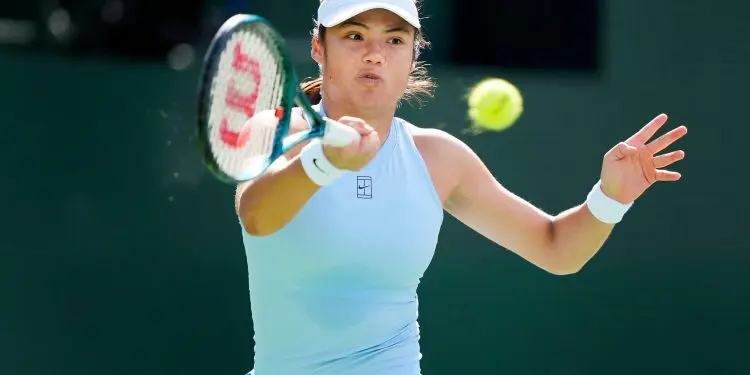
In the fast-paced world of professional tennis, few stories captivate fans quite like that of Emma Raducanu, the 22-year-old British sensation whose meteoric rise has been both a blessing and a burden. On April 7, 2025, as the clay-court season unfurls across Europe, Raducanu finds herself at a crossroads, her latest decision sparking heated debate among pundits and supporters alike. Fresh off an impressive quarterfinal run at the Miami Open, where she toppled a trio of American stars before falling to eventual runner-up Jessica Pegula, Raducanu has chosen to skip Great Britain’s Billie Jean King Cup qualifiers against Germany and the Netherlands. Instead, she’s turning her focus inward, prioritizing her personal quest for Grand Slam glory over national duty—a move that’s drawn comparisons to the ruthless, single-minded ambition of billionaire Roman Abramovich, the former Chelsea FC owner known for his decisive, often controversial leadership.
Raducanu’s journey since her fairy-tale 2021 US Open victory has been anything but smooth. At just 18, she stunned the world by becoming the first qualifier to win a Grand Slam, a feat that catapulted her into the global spotlight and piled sky-high expectations onto her young shoulders. Yet, the years that followed brought a rollercoaster of injuries, coaching upheavals, and inconsistent results, leaving her ranked No. 48 as of this spring. Her recent Miami performance, however, hinted at a resurgence. She dispatched eighth seed Emma Navarro, McCartney Kessler, and 17th seed Amanda Anisimova in succession, showcasing the aggressive baseline play and fearless mentality that once made her a champion. “I’m actually feeling like there’s progress,” she said after her Miami run, her voice carrying a mix of relief and determination. “All I want to see is that I’m getting slightly better.”
But now, with the Billie Jean King Cup looming—a team event where Britain would lean on her star power—Raducanu has opted out, a choice that’s raised eyebrows and ignited a firestorm of opinions. Some see it as a pragmatic step, a chance to safeguard her body and sharpen her game ahead of the French Open in May. After all, staying injury-free has been a persistent challenge; last year alone, she underwent surgeries on both wrists and an ankle, sidelining her for months. “Getting to a Grand Slam final injured is a lot more difficult,” one observer noted, pointing to the physical toll of a packed schedule. Others, however, view her withdrawal as a bold, almost Abramovich-esque gambit—prioritizing individual legacy over collective loyalty, much like the Russian tycoon who reshaped Chelsea by axing managers and chasing trophies with unrelenting focus.
“I think she’s doing things the right way,” a seasoned tennis voice remarked, defending her choice. “How many people will ask her about BJK Cup titles when she retires? A lot more will care about how many Grand Slams she’s won.” It’s a sentiment that underscores the stakes for Raducanu. Her legacy, many argue, hinges on recapturing the magic of Flushing Meadows, not on team accolades. And with stability off the court still elusive—she’s cycled through coaches like Abramovich once did managers—a period of calm could be the key to unlocking her potential. “If everything off the court were going swimmingly, maybe questions would be asked about why she won’t represent her country,” the same voice added. “But now isn’t the right time.”
Raducanu herself has stayed tight-lipped about the decision, but her actions speak volumes. Her Miami success—her best showing at a WTA 1000 event—has vaulted her back into the top 50, a rankings jump that signals she’s trending upward. Yet, the clay season demands a different beast: endurance, adaptability, and a knack for sliding on the red dirt. By skipping the qualifiers, she’s betting on herself, banking on extra preparation time to hone her game for Roland Garros, Wimbledon, and beyond. “She has something very special,” a former Grand Slam champion once said of her US Open triumph. “It’s not luck.” That belief in her raw talent fuels the argument that this “selfish” move could pave the way for more Major titles, even as it risks alienating fans who crave her presence in national colors.
The parallels to Abramovich aren’t lost on the tennis world. Just as he transformed Chelsea with a clear-eyed vision, Raducanu seems intent on sculpting her career with the same unapologetic resolve. Whether it’s emulating his decisive nature or chasing her own version of glory, one thing is clear: Raducanu’s path is hers alone to forge. As she gears up for the clay courts of Madrid and Paris, the question lingers—will this gamble pay off with another Grand Slam crown, or will it mark another chapter in a career defined by what-ifs? For now, the tennis world watches, waits, and debates, captivated by a young star unafraid to bet on herself.
Leave a Reply